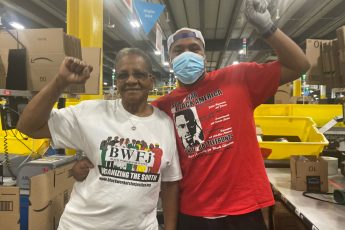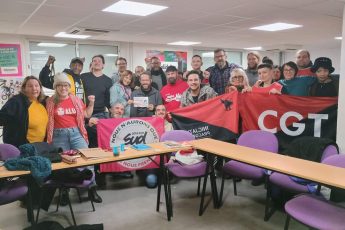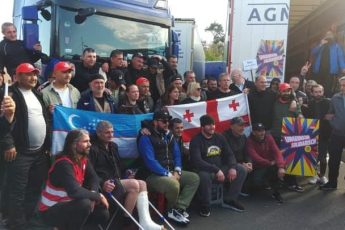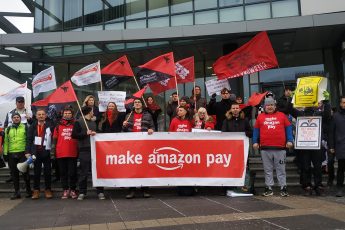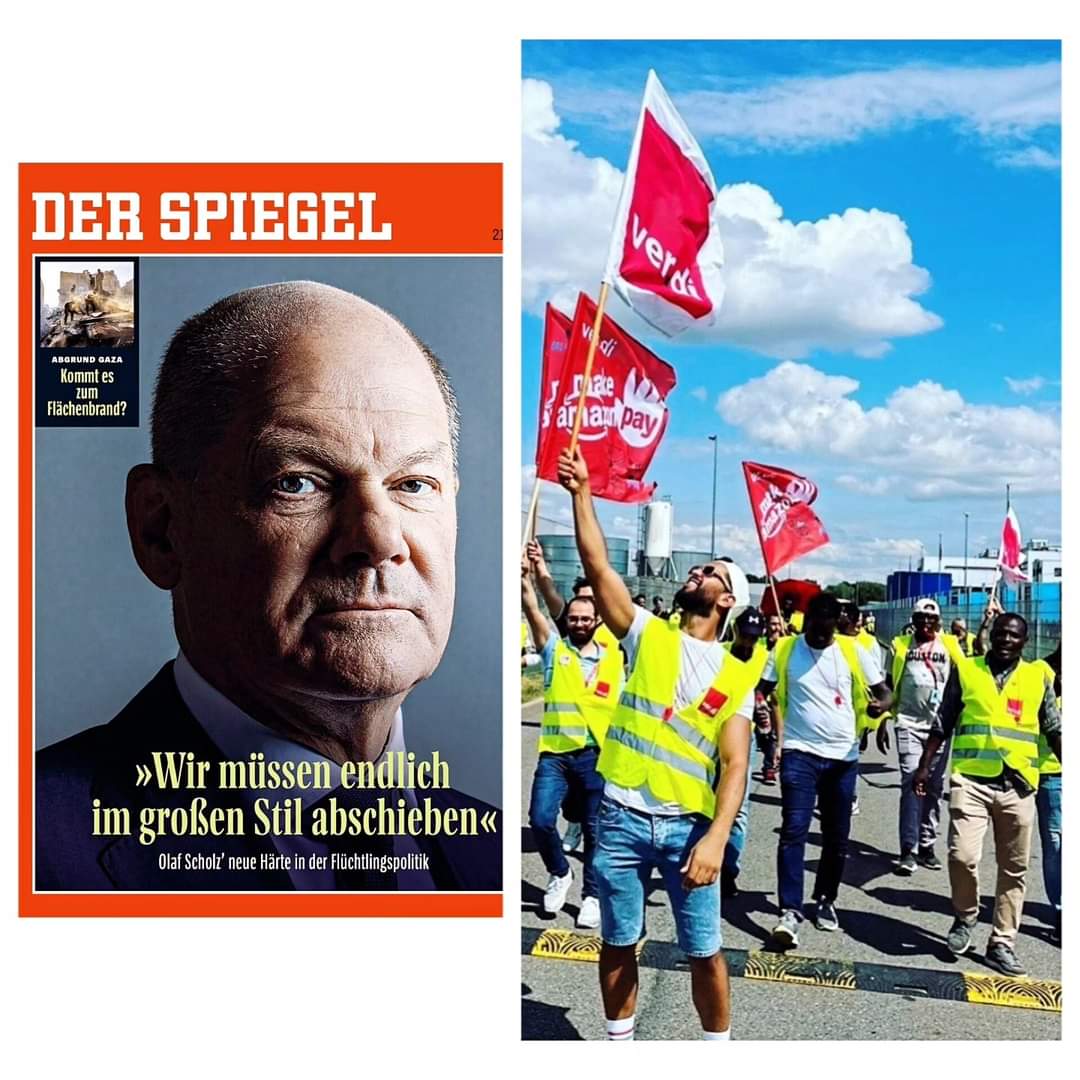
An Interview with Nonni Morisse (Ver.di Amazon, Germany)
Today, the German social-democratic government announced to have reached a deal with the German states on a tougher migration policy and on reducing the benefits for asylum seekers, in the same day when the Italian far-right government revealed its agreement with Albania to create and manage on the other side of the Adriatic Sea two detention centers for migrants. These two decisions clearly show the convergence of European governments from across the political spectrum on a migration policy that seeks to restrict and externalize border control, after the failure of the deal with Tunisia in the past months. In this interview to Nonni Morisse, a ver.di union secretary for Amazon in Germany, we discussed the German turn in migration policy in the context of the far-right’s electoral rise and of war, both in Palestine and in Ukraine. The interview shows how the German government’s decisions could impact migrant workers within Amazon and beyond, by aggravating the condition of blackmail that they have to face. It also problematizes the role of unions in organizing migrant workers and stresses the importance of organizing on a transnational level.
TSS: A few weeks ago, German chancellor Scholz, as a reaction to his party’s electoral defeats against the far-right, declared his intention to increase large-scale deportations of illegal migrants. What do you think of this announcement? What kind of impact do you think it could have?
NONNI MORISSE: The statement of the German chancellor Scholz was a reaction on a wave of far-right votings and the attempt of the German conservatives (CDU) to ride this wave with racist statements. It’s shameful that the German Socialdemocrats are turning to the same point proposing law and order policies. It’s not only Scholz’s statement: some weeks ago the government spread a bill with some really bad turns in asylum law. They want to deport people without any announcement and extend the detention time before a deportation. At the end it won’t increase the number of deportations but increase the pressure on refugees and psychologic damages.
With the rising numbers of migrants arriving this summer and early fall, the German government has tightened its migration policy in the context of a broader European attempt to restrict border controls. Do you think the German government and the EU are increasingly lining with the far-right on the migrants’ question?
Yes, too sad to say, they are doing so more and more. The German government justifies it with cohesion in society, so they are afraid of far-right movements and they hope that, by acting like the far-right in this question, they would defeat them. Instead, a humanist reply could be a better financing for the municipalities that take care of refugees, tax the rich and tear down the European wall at the external borders and abolish Frontex.
Do you think the explosion of the conflict in Israel, which led to increased repression against Arabs and Muslims in Germany, had a role in Scholz’s declarations?
The escalation of Israel’s war and occupation against Palestinians and the Hamas’ attacks against Israeli civilians led to an increase in the racist “migration debate” by politicians and media in Germany but this bad attempt to defeat the AfD right wing extremist by acting like them began months before. In May 2023 the federal ministers had a meeting with the interior minister and agreed to a tightening of the residence law. In October the interior minister published the first drafts on this announcing faster deportations and some horrible points like the possibility of 28 days’ detention period before deportation. Just as the German government used the war in Ukraine as an opportunity for previously planned military build-up, it is now using the escalation in the Middle East for racist asylum politics, which it was planning to do anyway.
How many migrants work in your Amazon warehouse? How does the problem of documents impact their working conditions? Have their conditions changed in the past few months?
In our union district in lower Saxony and Bremen we have over 80% migrants working in the Amazon warehouses. The problems of residence and work permits are huge and create a lot of pressure on the workers. By German law the residence and work permits are linked to each other. If you lose your residence permit, you lose your job. If you are losing your job you may lose your residence permit. That’s horrible and, compared to the situation of German workers, shows a lack of democratic rights because fearing deportation means you are more afraid to organize in a union or getting elected to a workers’ council.
We are trying to give advice and support as a union in these topics as well, but to be honest: it depends a lot on the union district. As Ver.di union we are still not focused on migrant workers and in my opinion this tends to create divisions among workers. There is a strong tradition of migrant labor disputes in Germany, for example the powerful migrant strikes in the 1970s at Ford in Köln and Hella in Lippstadt, but they have not yet led to lasting change in union bodies. The proportion of migrant workers among union members is much higher than the proportion of migrant workers among union officials and decision-makers.
The past few months were contradictory because one year ago the German government started with the act of residence permit chances, a law with the possibility to get in a first step 18 months permit and in a second step a longtime permit. It’s been a good opportunity for a lot of Amazon workers to get longtime permit and a bit more confidence. Now the current debates are destroying trust, a lot of colleagues are afraid the government could change laws in a way they could lose their status. The government is talking a lot about criminal migrants, but there are a lot of “crimes” that could trigger a deportation that are only affecting foreign law, i.e., violations of some foreign law obligations that can’t be done by Germans. Another typical case is allegation of theft at work by Amazon. Amazon has a system of witness statements by managers so if they want they could harm you a lot as a migrant worker.
How have working conditions changed in Amazon warehouses since the pandemic? What kind of impact did the war in Ukraine and the rise of inflation have on wages and working conditions within Amazon and more in general?
During the pandemic, Amazon workers have told us about intense surveillance and control. Special cameras were installed to measure the distances between workers. Anyone who didn’t comply got an admonition by the manager or a warning letter. At the same time, health protection was neglected by banning the wearing of FFP2 masks in Amazon sites. According to medical guidelines, workers with FFP2 masks would have had the right to take additional breaks: that’s why they banned it. With the war and inflation, many Amazon workers have had huge problems financing their everyday lives. The wages at Amazon are above the minimum wage and have been raised a little every year as a result of our strikes, but always below the inflation rate, so that the wages are less and less enough to live on. We are sure that this is actually also a problem for the local Amazon management, who only gets instructions from the corporate headquarters. It is becoming increasingly difficult for Amazon to get new employees because other companies pay just as much or more.
For almost a decade now, Amazon workers have been trying to connect their struggle at a transnational level, often succeeding in taking common stands, at other times struggling to bring forward a strong connection. What do you think should be the path ahead for Amazon workers, both migrants and non-migrants, to organize together in Europe and beyond?
In recent years, global unionization of Amazon workers has been on the rise. Since the first strikes began in Germany a decade ago, more and more countries are joining the movement. The grassroots movement, Amazon Workers International, is now represented on multiple continents, facilitating regular exchange among employees through video calls and in-person meetings. I am convinced that we can only overcome corporations like Amazon and democratically control them on an international level. To achieve this, we must fight for spaces within large labor unions and ensure that networking doesn’t just stop at that but also involves coordinating cross-border strike actions and pressure campaigns. We are currently working on this at various locations and always appreciate platforms like TSS that support these organizational forms.


